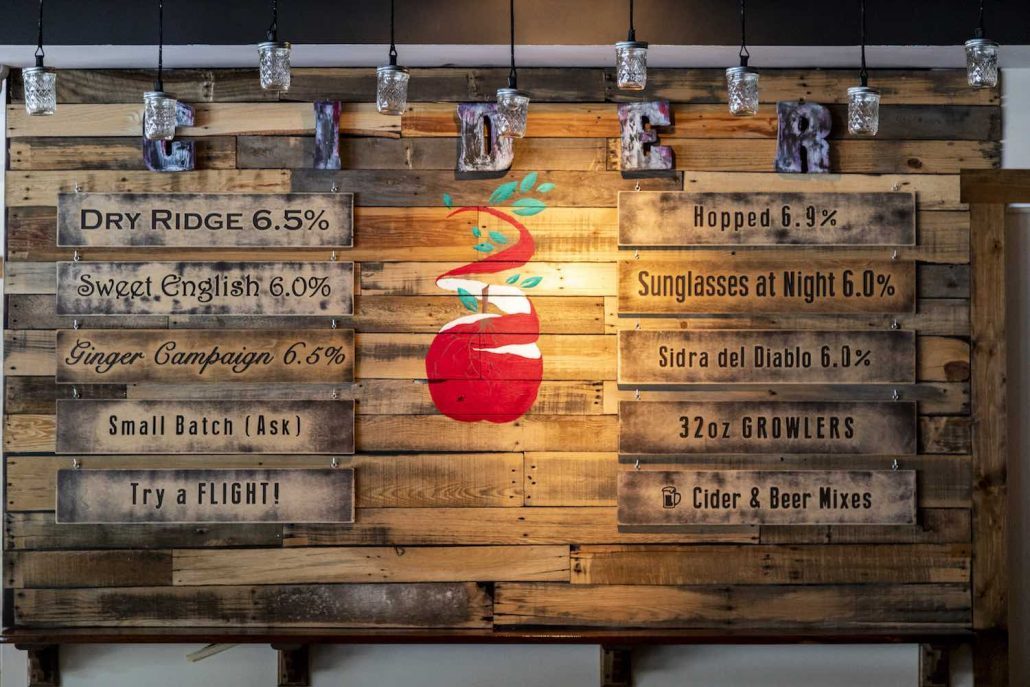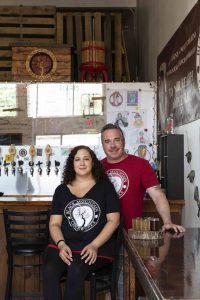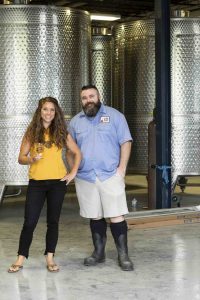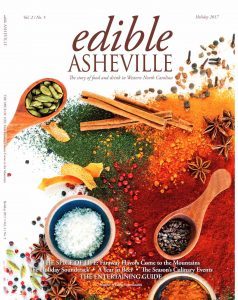Cider City, USA
Move over, beer—there’s a new drink in town
By C.A. Carlson | Photos by Erin Adams
As bartenders bring back classic cocktails and beer fans geek out over traditional European styles, cider is poised to be the next retro beverage revival. Whether you’re interested in artisan brewing, local sourcing, or gluten-free living, the cider scene—especially in the Asheville area, with its easy access to the apple crops of Henderson County—offers a taste of history, updated for modern palates.
Today’s cider is not the unfiltered apple juice you might get at an orchard in the autumn, nor the sickly sweet drink you may have found shelved next to hard lemonade and other “alcopops” in past decades. It’s a craft beverage whose past and future are celebrated by these three local cider makers.
Black Mountain Ciderworks + Meadery
When the Romans invaded Britain around 55 BC, they found the locals tipsy on fermented apple juice. Early apple trees, grown from seed, didn’t yield the sweet harvest that results from more modern grafting techniques, and the fermented juice was a way to make use of fruit too acidic to eat.
In England’s West Country, cider traditions grew alongside the legend of King Arthur, and the first English settlers turned the inedible crabapples they found on this continent into a drink that kept the colonies going until grain farming allowed for the production of beer. It’s estimated that in 18th century America, adults consumed at least a pint of cider a day as an alternative to potentially polluted water, and even children drank a low-alcohol version called Ciderkin.
This is the history honored by David and Jessica Bowman at Black Mountain Ciderworks + Meadery. Former English teachers who had experimented with brewing and winemaking, the Bowmans brought home a passion for cider from a trip to Britain in 2009, where they sampled a dry, complex style hard to find in this country. They started buying fruit from farmers in nearby Henderson County, which grows 65 percent of North Carolina’s crop and is ranked seventh in the nation among apple-producing counties.
“When we were making beer and wine, the barley came from Canada, and the grape juice came from California, and it all tasted the same,” says David Bowman. “Jessica is from Goldsboro, I’m from Durham, and it became important to us to create something that was uniquely North Carolina. We got our apples from right across the mountain, and just like grapes can express the terroir of their region, North Carolina apples are unique, and the cider that comes from them reflects the soil, the elevation, everything about our region.”
The Bowmans’ first batches of cider were made with an old farmer’s basket press—just a hand-cranked device that would be right at home next to a butter churn—but by 2014, they were producing enough to open their Black Mountain taproom and start offering cider to the public.
The erstwhile educators are happy to serve up lessons on the beverage, too. “Cider has gotten a bad name from industrial products that use concentrates and artificial flavors and that are more related to a wine cooler than what we make,” says Bowman.
“A lot of our evangelizing is just showing customers that real cider is good. Balance is the most important aspect. A whiff of sweetness is fine, but our cider tends to be drier than most people are familiar with. It’s a more complex drink than just apple flavor and alcohol.”
The couple’s cider offerings reflect the seasons. “When the harvest comes in, that’s when our real work begins,” says Bowman. “In the autumn, the smell of apples is in the air, and we start pressing the first of that year’s crop.” The result is the Bowmans’ Nuncio, a bright and acidic young cider made with early Ginger Gold and Golden Delicious apples. Later in the fall, the Bowmans will release other ciders—the Scarecrow, made with a chai spice blend, and the Croatan, which brings sweet potato into the mix—that reflect the turn in weather. By late spring, though, their taps are flowing with the Good Queen Bess, which has a touch of lavender (“but not like Grandma’s bath soap,” says Bowman), and the Zephyrous, spiked with ginger and candied orange peel.
The release of these ciders is often marked with a public event at the taproom off Old Highway 70, just east of downtown Black Mountain. The Bowmans also host a Guy Fawkes party every November—named after the man who participated in a failed plot to blow up England’s House of Lords in 1605—to commemorate the British roots of cider. “We celebrate the idea of the West Country, a more rural part of England where cider has never really stopped being the main drink,” says Bowman. “For us, in our little mountain cidery, that’s an important tradition.”

Urban Orchard Cider Co. & Bar
“Cider is wine, just made from apples instead of grapes,” says Josie Mielke, an owner and the operations director of Urban Orchard. It was as a wine drinker that Mielke came to the cider business in 2013, when she joined forces with her parents and her brother to open the popular cidery and taproom in West Asheville, and she crafts ciders that, like a good Cabernet, benefit from some aging.
“Aging allows the yeast used in the fermenting process to drop out of the solution, so you get really beautiful clarity without using filtration,” says Mielke. “All of our ciders are unfiltered, and we age all of them a minimum of four months, so the flavor can develop. There’s a lot of craft that goes into good cider.”
And a lot of apples go into it, too. Like the Bowmans, Mielke and her family, all native Ashevillians, wanted to take advantage of the abundance of apples grown down the road in Henderson County. She studied cider making in England and then came home to form relationships with local farmers who keep Urban Orchard supplied with fruit. Since few growers in this country produce the cider-specific apples more common in Europe, she typically works with dessert and eating apples.
While Mielke has made some single-varietal ciders with Granny Smiths and Honeycrisps, most of her ciders start with a blend. “You’re always looking for tartness, because that flavor will carry through the fermentation process, and you need sweetness, because those sugars are what will become the alcohol,” Mielke says.
From that blend, Mielke crafts a wide variety of flavors by introducing other ingredients at different stages of the process. For example, she may add blueberry juice from local farm Cedar Grove to a cider after it’s been fermented, which leads to a sweeter beverage. Then she may add the hulls from those berries to another batch—a small batch is about three barrels, or 93 gallons, and a larger one might fill a 250-gallon tank—before fermentation, so the end result is a drier cider that still tastes of the fruit. Mielke often incorporates herbs into her cider, especially summer releases like the strawberry and basil, and the watermelon and mint.
“Cooking is one of my favorite things, and that’s the fun part of the job, finding elements that complement each other,” says Mielke, who has been avoiding gluten for years and appreciates cider as an alternative to grain-based beer.
To introduce a customer to the beverage, she’ll pour a flight that starts with two classics: the Dry Ridge, a cider made with white-wine yeast, and the Sweet English, which lives up to its name. If a customer prefers the former, she might ramp them up to a bone-dry hopped cider, with echoes of an I.P.A.; fans of the sweet may like one of her fruitier blends. The adventurous, meanwhile, often try one of Urban Orchard’s spicy ciders, made with peppers ranging from jalapeño to scorpion. The most popular, habanero-spiked Sidra Del Diablo, was originally created for the cidery’s annual bash on the last Saturday in October, to mark the anniversary of their grand opening on Halloween.
There will be even more to celebrate this year: in the early fall, Urban Orchard will move its production from the basement of the Haywood Road location to a much larger facility on South Slope, with a taproom to draw the brewery-tour crowd. Fans of the West Asheville branch needn’t worry, though; it will remain open. “We’ve got a lot of really awesome locals who come here, and that’s one of the reasons we’ve done so well,” says Mielke. “With the range of ciders that we produce, everybody can find something they like a lot.”

Daidala Ciders
Remember learning about Johnny Appleseed in elementary school? Your teacher probably didn’t tell you that the itinerant 19th century preacher wasn’t planting apples for pie as he carried seeds into pioneer territory (he got as far south as Tennessee, stopping just short of Western North Carolina). The fruit from his trees was destined for hard cider, and he sold his orchards for a profit to the settlers who arrived after him and who needed a safe, reliable source of drink.
Chris Heagney, the founder of Daidala Ciders, is a modern cider nomad. Instead of investing in a production facility of his own, he partners with cideries that have extra capacity—currently, Red Clay Ciderworks in Charlotte and Cider Riot! in Portland, Oregon—to create inventive small-batch ciders that he shares with the public through a taproom in Asheville’s River Arts District. It’s an approach long familiar to beer connoisseurs, as “gypsy brewers” travel from brewery to brewery, but Heagney may be the first and only cider maker to hit the road in this way.
“It lets me make really interesting ciders, unique styles,” says Heagney, who started out in the beer industry but shifted focus during a stint in Portland at Reverend Nat’s Hard Cider, an early leader of the cider revival. When he decided to go into business for himself, the Connecticut native moved back east to be closer to family, and he chose Asheville as his home base for the qualities it shares with the Pacific Northwest: great access to nature and a vibrant brewing community.
“I’m inspired by the ‘no rules,’ experimental spirit of craft beer,” says Heagney. Sometimes that influence is obvious, as in Daidala’s Green Glory. Described by Heagney as “my shot at an I.P.A.,” it’s boiled with hops, giving it some of the aroma and body of the popular beer style but without as much bitterness.
Other Daidala ciders may not resemble beer in flavor, but they reflect the same freewheeling approach as the most inventive craft breweries. The Kiwi Kin is crisp and light, with a little farmhouse funk from the cider resting on the kiwi, Heagney adds, and his Mandarina Sangria smells and tastes remarkably like its namesake, thanks to the lemongrass, star anise, and orange peel in the mix.
It’s the perfect drink for a summer day, but you’ll be able to cheer your winter with Daidala’s spiced cherry cider, aged in bourbon barrels. At any given time, Heagney offers four ciders—the Green Glory, a couple of seasonal styles, and an experimental wild card—in his taproom. He shares the space in the historic Cotton Mill Studios with artist Andy Herod, who exhibits and sells his totemic images of animals there. Herod created the nomadic creature that appears on the Daidala label. It’s a symbol of Heagney’s commitment to pioneering new trails in the cider industry.
“There’s a lot of room for small producers like me, and a lot of customers to educate and turn into cider drinkers,” says Heagney, who has started hosting live music events to bring crowds into the space. “Too many people think that they don’t really like cider because they’ve been turned off by excessively sweet drinks, but when I give them a couple of splashes, they get excited, and they change their minds. I want to push the boundaries of what cider can be.”
◊◊
Before this article, you couldn’t pry the rye whiskey out of C.A. Carlson’s hand, but she’ll be enjoying one of these great ciders by the fire this autumn at her home in West Asheville. She is the copy editor of Edible Asheville.
Save
Save
Save
Save
Save
Save
Save
Save
Save
Save

Jessica and David Bowman of Black Mountain Ciderworks + Meadery

Josie Mielke and Gregory Hill, co-owner and production director, respectively, of Urban Orchard Cider Co. & Bar

Gregory Heagney, founder of Daidala Ciders
THE WEEKLY REVEL
Sign up for your free handpicked guide to enjoying life around Asheville.
Available weekly from May to October.





